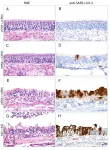(Press-News.org) COLUMBIA, Mo. -- A recent grant from the Missouri Department of Economic Development will help train hundreds of MU students to become part-time nurse assistants at MU Health Care.
The three-year grant, which starts in fall 2023, will create a three-credit hour elective course within the MU Sinclair School of Nursing. The class will help nearly 100 MU students each year earn paid, part-time positions within MU Health Care as nurse assistants, also known as unlicensed assistive personnel (UAPs), certified nurse assistants (CNAs) and patient care technicians.
“We currently have nearly 800 pre-nursing undergraduate students at MU, and as a professor teaching a freshmen-level course, I often get asked by my students if there are opportunities available to work at MU Health Care before they begin nursing school their junior year,” said Robin Harris, an associate teaching professor in the Sinclair School of Nursing and the grant’s primary investigator. “I also hear from our partners at MU Health Care about staffing shortages throughout the health care industry, particularly the need for more nurses and especially nurse assistants, so we want to support this pipeline of students to help bridge the gap and serve both populations.”
After completing the elective course, which is open to both freshmen and sophomore pre-nursing students at MU as well as any MU undergraduate student looking for professional experience in the health care industry, the students will apply what they have learned during 100 hours of paid clinical training as a part-time nurse assistant within MU Health Care’s University Hospital.
“I started my nursing journey as a nurse assistant, and to this day I still feel they do the most important jobs in the hospital for patient care,” said Jennifer O’Connor, an assistant teaching professor in the Sinclair School of Nursing and co-investigator on the grant. “They feed patients, clean their bed sheets, help them get to the bathroom and shower, wash their hair and take their vital signs. They are the unsung heroes who show compassion to patients, and they remind us that nursing is regarded as one of the most trusted professions.”
Harris added the paid opportunity ‘kills two birds with one stone’ by allowing students to ‘earn while they learn,’ which may reduce the need for students involved to take out student loans before graduation.
“We are doing our part to address the nursing shortage and provide MU students with both employable skills and the opportunity to gain real-world experience working in the health care industry,” Harris said. “Investments in initiatives like this are critical from a workforce development standpoint, and MU may serve as a model for other universities wishing to create similar pipelines to support hospitals and nursing homes with staffing shortages.”
-30-
END
MU grant will help ease nursing workforce shortage
$800,000 Missouri Department of Economic Development grant, running from 2023 to 2026, will train 300 MU students as nurse assistants within MU Health Care
2023-04-03
ELSE PRESS RELEASES FROM THIS DATE:
Yale-led team creates comprehensive resource for impact of genomic variants
2023-04-03
New Haven, Conn. — Each person has about 4 million sequence differences in their genome relative to the reference human genome. These differences are known as variants. A central goal in precision medicine is understanding which of these variants contribute to disease in a particular patient. Therefore, much of the human genome annotation effort is devoted to developing resources to help interpret the relative contribution of human variants to different observable phenotypes – i.e., determining variant impact.
Recently, Yale School of Medicine led a large NIH-sponsored study where multiple institutions and international collaborators came together ...
Illegal trade and poor regulation threaten pangolins in China
2023-04-03
Pangolins, unique scale-covered mammals, are drastically declining in numbers across Asia and Africa, largely due to illegal trade. Part of the trade, both legal and illegal, supports the traditional Chinese medicine market, which has attracted conservation attention. The level of demand for pangolins and other animals in traditional Chinese medicine, however, hasn’t been thoroughly studied.
In a new study published in the journal Nature Conservation, Dr Yifu Wang, currently a postdoc researcher at the University ...
DELLA proteins could hold key to the next Green Revolution
2023-04-03
A family of ‘promiscuous’ proteins found in all land plants is responsible for many different plant functions, despite remaining relatively unchanged for over 450 million years.
New findings, published in Nature Plants and New Phytologist reveal new knowledge about how DELLA proteins regulate how much a plant grows, when germination occurs and how plants deals with threats such as drought and disease. The key is not in DELLA proteins’ ability to mutate over time, but instead in their ability to interact with dozens of different transcription factors, the proteins responsible for decoding DNA.
Understanding the mechanisms which underpin ...
Rising temperatures alter ‘missing link’ of microbial processes, putting northern peatlands at risk
2023-04-03
If you’re an avid gardener, you may have considered peat moss — decomposed Sphagnum moss that helps retain moisture in soil — to enhance your home soil mixture. And while the potting medium can help plants thrive, it’s also a key component of peatlands: wetlands characterized by a thick layer of water-saturated, carbon-rich peat beneath living Sphagnum moss, trees, and other plant life.
These ecosystems cover just 3% of Earth’s land area, but “peatlands store over one-third of all soil carbon on the planet,” explains Joel Kostka, professor and associate chair of Research in the School of Biological ...
Maclean studying paid sick leave mandates & mental health care service use
2023-04-03
Catherine Maclean, Associate Professor, Schar School of Policy and Government, received $641,155 from the National Institutes of Health for: "Paid Sick Leave Mandates and Mental Healthcare Service Use."
This project will provide the first causal estimates of the effect of state and local paid sick leave (PSL) mandates on access to PSL among those with mental health disorder(s), use of mental health care, and indicators of potential quality of mental health care received. It will also examine how community-level factors (e.g., mental health ...
How two different types of immune cells help two billion people keep tuberculosis in check
2023-04-03
More than 10 million people are sickened by tuberculosis (TB) globally each year, resulting in 1.5 million deaths. Yet, as many as two billion people are infected with Mycobaterium tuberculosis, the bacterium that causes tuberculosis, and are otherwise healthy and asymptomatic. Scientists who study TB look at those individuals who can tolerate and contain the infection in hopes of developing better treatments and vaccines.
The key feature of tuberculosis infection in humans is the formation of granulomas, or clusters of immune cells in the lungs that contain the infection. These granulomas contain B cells, all-purpose immune cells that perform a variety of functions, from producing ...
Do Earth-like exoplanets have magnetic fields? Far-off radio signal is promising sign
2023-04-03
Earth's magnetic field does more than keep everyone's compass needles pointed in the same direction. It also helps preserve Earth’s sliver of life-sustaining atmosphere by deflecting high energy particles and plasma regularly blasted out of the sun. Researchers have now identified a prospective Earth-sized planet in another solar system as a prime candidate for also having a magnetic field — YZ Ceti b, a rocky planet orbiting a star about 12 light-years away from Earth.
Researchers Sebastian Pineda and Jackie Villadsen observed a repeating radio signal emanating from the star YZ Ceti using the Karl G. Jansky Very Large Array, a radio telescope ...
Higher lithium levels in drinking water may raise autism risk
2023-04-03
Pregnant women whose household tap water had higher levels of lithium had a moderately higher risk of their offspring being diagnosed with autism spectrum disorder, according to a new study led by a UCLA Health researcher.
The study, published April 3 in JAMA Pediatrics, is believed to be the first to identify naturally occurring lithium in drinking water as a possible environmental risk factor for autism.
“Any drinking water contaminants that may affect the developing human brain deserve intense scrutiny,” said lead study author Beate Ritz, MD, PhD, professor of neurology in the David Geffen School of Medicine at UCLA ...
Nasal vaccine to prevent COVID-19 passes first tests
2023-04-03
Since the beginning of the COVID-19 pandemic, researchers have been working on mucosal vaccines that can be administered through the nose. Now, scientists in Berlin have developed a live attenuated vaccine for the nose. In “Nature Microbiology”, they describe the special immune protection it induces.
Joint press release by Freie Universität Berlin, Max Delbrück Center and Charité – Universitätsmedizin Berlin
Coronaviruses spread primarily through the air. When infected people speak, cough, sneeze or laugh, they expel droplets of saliva containing the virus. Other people then breathe ...
Research finds global emissions of several banned ozone-destroying chemicals are increasing
2023-04-03
The research, published today in Nature Geoscience and led by the University of Bristol and National Oceanic and Atmospheric Administration (NOAA), puts the rise in part down to the chemicals, known as chlorofluorocarbons or CFCs, being used to make other ozone-friendly alternatives to CFCs. This is an exception allowed under the Montreal Protocol, but contrary to its wider goals.
Lead author Dr Luke Western, a Research Fellow at the University of Bristol and researcher at the NOAA’s Global Monitoring Laboratory (GML), said: “We’re paying attention to these emissions now because of the success of the Montreal Protocol. CFC ...
LAST 30 PRESS RELEASES:
Natural selection operates on multiple levels, comprehensive review of scientific studies shows
Developing a national research program on liquid metals for fusion
AI-powered ECG could help guide lifelong heart monitoring for patients with repaired tetralogy of fallot
Global shark bites return to average in 2025, with a smaller proportion in the United States
Millions are unaware of heart risks that don’t start in the heart
What freezing plants in blocks of ice can tell us about the future of Svalbard’s plant communities
A new vascularized tissueoid-on-a-chip model for liver regeneration and transplant rejection
Augmented reality menus may help restaurants attract more customers, improve brand perceptions
Power grids to epidemics: study shows small patterns trigger systemic failures
Computational insights into the interactions of andrographolide derivative SRJ09 with histone deacetylase for the management of beta thalassemia
A genetic brake that forms our muscles
CHEST announces first class of certified critical care advanced practice providers awarded CCAPP Designation
Jeonbuk National University researchers develop an innovative prussian-blue based electrode for effective and efficient cesium removal
Self-organization of cell-sized chiral rotating actin rings driven by a chiral myosin
Report: US history polarizes generations, but has potential to unite
Tiny bubbles, big breakthrough: Cracking cancer’s “fortress”
A biological material that becomes stronger when wet could replace plastics
Glacial feast: Seals caught closer to glaciers had fuller stomachs
Get the picture? High-tech, low-cost lens focuses on global consumer markets
Antimicrobial resistance in foodborne bacteria remains a public health concern in Europe
Safer batteries for storing energy at massive scale
How can you rescue a “kidnapped” robot? A new AI system helps the robot regain its sense of location in dynamic, ever-changing environments
Brainwaves of mothers and children synchronize when playing together – even in an acquired language
A holiday to better recovery
Cal Poly’s fifth Climate Solutions Now conference to take place Feb. 23-27
Mask-wearing during COVID-19 linked to reduced air pollution–triggered heart attack risk in Japan
Achieving cross-coupling reactions of fatty amide reduction radicals via iridium-photorelay catalysis and other strategies
Shorter may be sweeter: Study finds 15-second health ads can curb junk food cravings
Family relationships identified in Stone Age graves on Gotland
Effectiveness of exercise to ease osteoarthritis symptoms likely minimal and transient
[Press-News.org] MU grant will help ease nursing workforce shortage$800,000 Missouri Department of Economic Development grant, running from 2023 to 2026, will train 300 MU students as nurse assistants within MU Health Care





